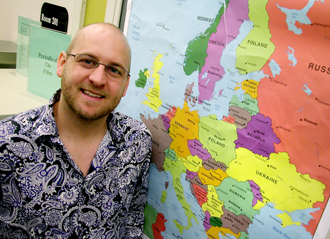From Moldova to Senegal, Fulbrights Explore the World
Brian Adams is cramming to learn the Romanian language this summer as he prepares for a Fulbright fellowship in Moldova. The medical and public health student, who is in the joint MD/MPH program at Tulane, will travel to the eastern European country to study the emergence of a strain of tuberculosis that can't be cured with standard antibiotic therapy.

Brian Adams is investigating the reemergence of tuberculosis as a global health risk. He'll spend 10 months in the eastern European country Moldova as a Fulbright fellow. (Photo by Alicia Duplessis Jasmin)
Adams, a native of Traverse City, Mich., will spend 10 months in Moldova. The reemergence of tuberculosis is a major global health risk, he says.
“My interest is piqued by the historical importance of the 'white plague' so named for the loss of skin color in people with the disease as well as the disproportionate challenges which face Third World nations in fighting to eradicate it,” Adams says. “The Moldovan struggle with tuberculosis is just one of many which are in need of visibility.”
Adams is one of four candidates for the Fulbright fellowship put forth by Tulane. “I am pleased to say that all four of Tulane's candidates who were recommended for the fellowship for 2009â“2010 received it,” says Rich Watts, associate professor of French and executive director of the Center for Global Education. Watts has served as the center's director since it was launched in 2007.
Other Tulane Fulbright fellows are:
- Elizabeth Bunde of Van Etten, N.Y., a doctoral student in international health and development in the Tulane School of Public Health and Tropical Medicine. Bunde will go to Jakarta, Indonesia, to pursue a project studying female sex workers and their male clients to examine the role of social networks in HIV/AIDS knowledge, risk perception, attitudes and condom use.
- Kathryn Rosecrans of Washington, D.C., who received a master of public health degree in international health and development in 2008. In rural villages of Mexico's Yucatan Peninsula, Rosecrans will study knowledge, attitudes and practices regarding Chagas disease, a potentially fatal parasitic disease transmitted by insects.
- Renata Maniaci of Sturgeon Bay, Wis., who earned a bachelor of arts in 2009 with a double major in anthropology and international development and a minor in French. Maniaci will expand a project that she began with Tulane's study abroad program in Senegal. As an undergraduate, she also spent a semester in Geneva, Switzerland. Her Fulbright project focuses on the anthropology of women's basketball teams in Senegal. She's examining gender roles and how women view professional basketball as a route to European immigration. She will be in Senegal for 10 months and is working on improving her fluency in Wolof, a native language spoken by 40 percent of the people in the western African country.
“For undergraduates, the takeaway message is that what makes a strong Fulbright candidate is compelling experience abroad in the junior year,” says Watts. “The Fulbright program is looking for sustained engagement within a particular subject field and area.”
In addition to the Fulbright fellowships, Watts encourages students to apply for the Fulbright English Teaching Assistantship program that is available in more than 40 countries. To strengthen an application for that program, Watts advises students to gain experience tutoring or teaching in New Orleans.
The Center for Global Education provides information to students interested in study abroad programs, the Fulbright and Fulbright-Hays fellowships, and other international studies programs.
Established in 1946, the Fulbright Program aims to increase mutual understanding between the peoples of the United States and other countries. It provides grants for international educational exchange for scholars, educators, graduate students and professionals. The Fulbright Program is one of the most prestigious awards programs worldwide, operating in 144 countries.
